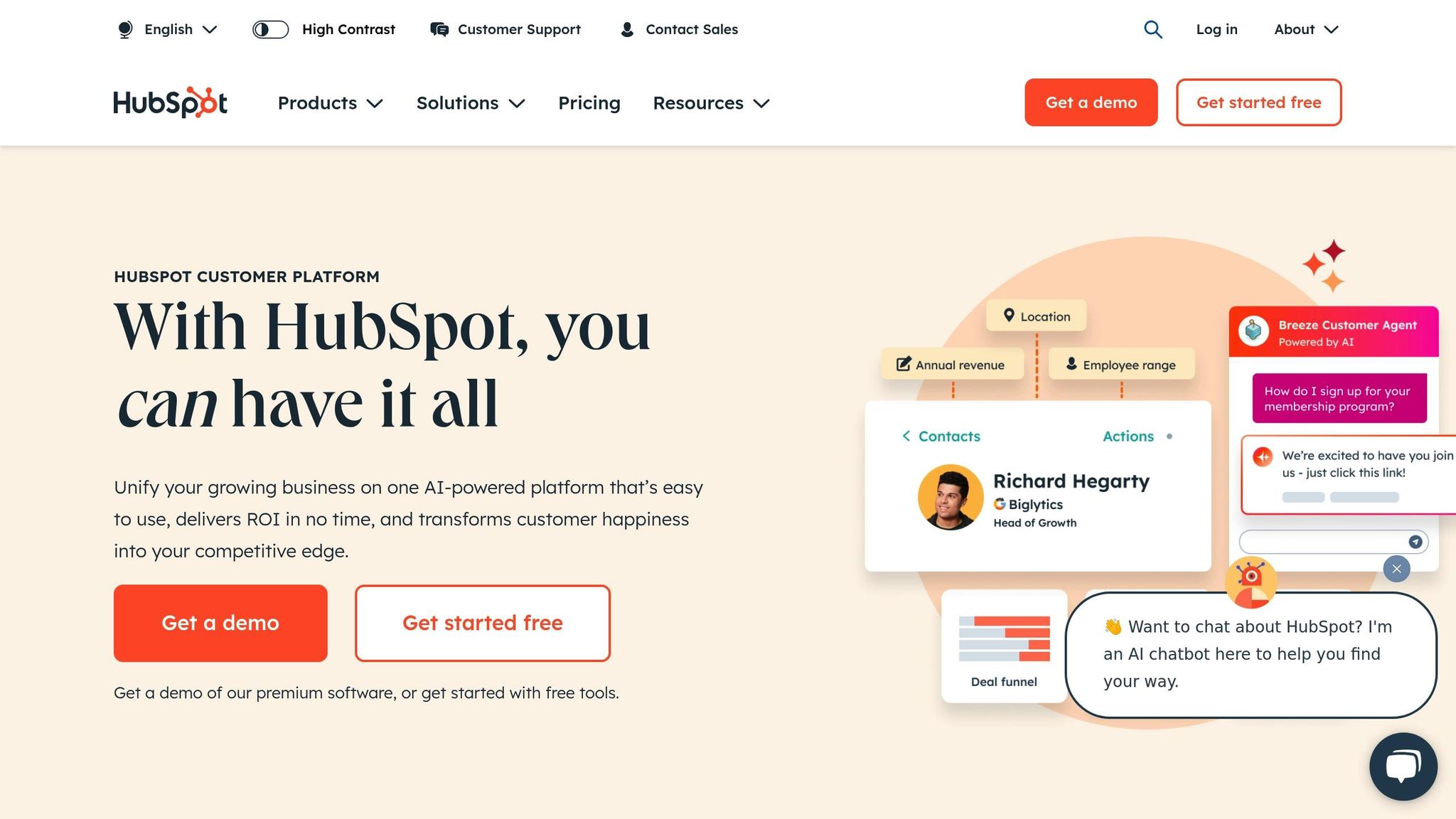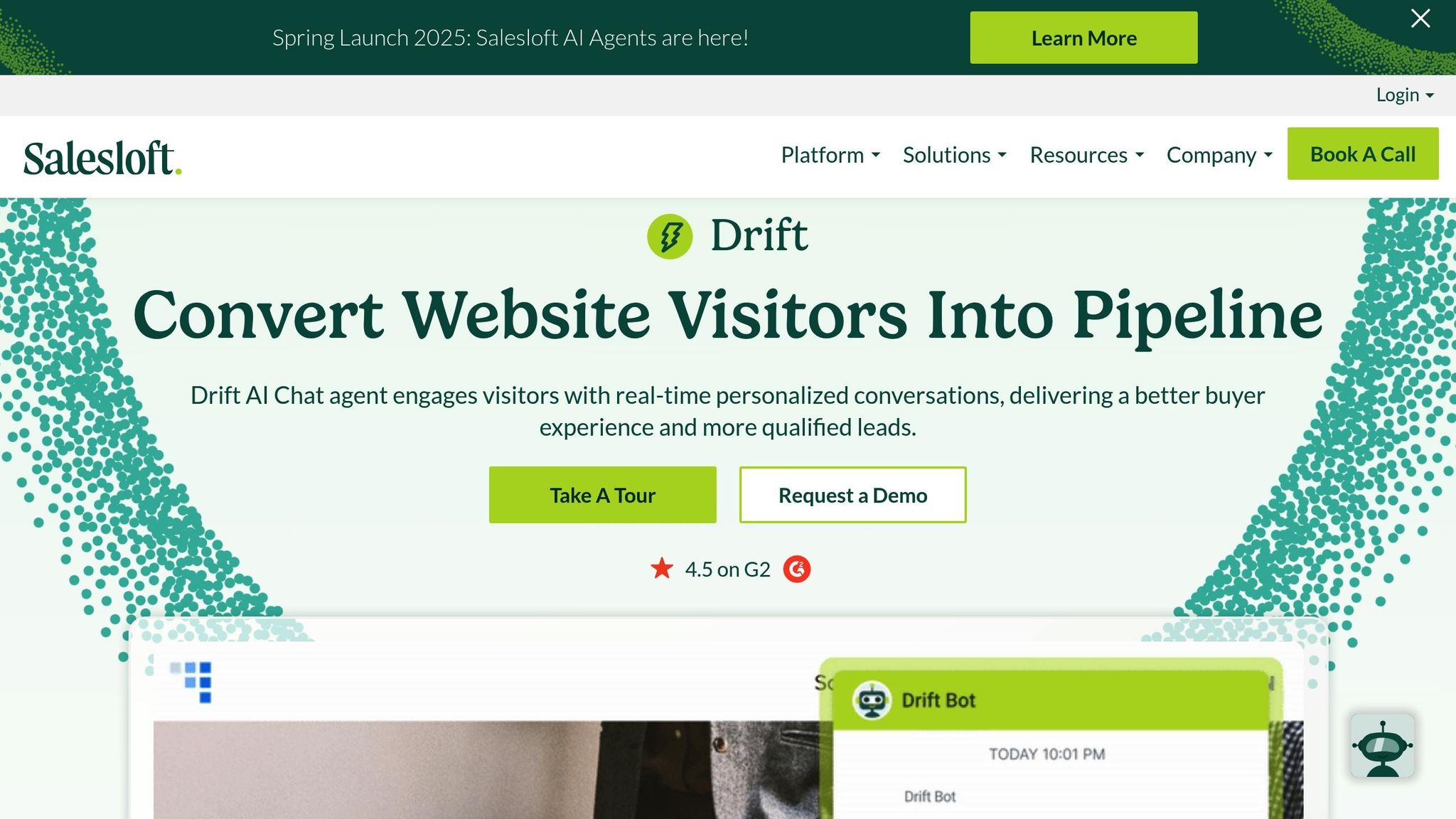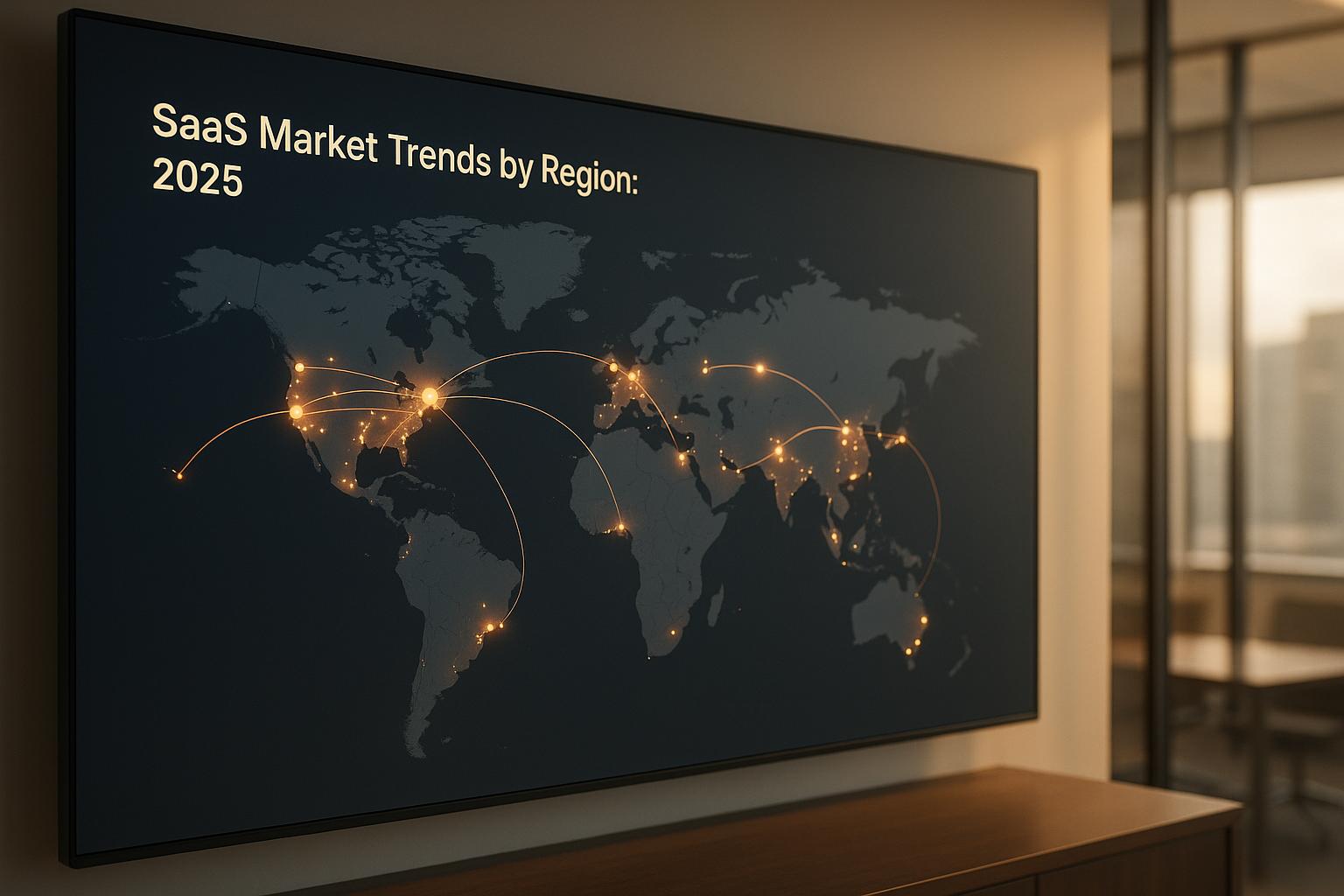AI-powered chatbots are transforming SaaS businesses by driving faster responses, improving customer support, and increasing conversion rates. Here’s a quick breakdown of how they deliver results:
- Boost Conversions: Websites using AI chatbots see a 23% increase in conversion rates.
- Speed Matters: Responding to leads within 5 minutes makes companies 100x more likely to convert leads.
- Cost Savings: They reduce service costs by up to 30% while managing 80% of routine queries.
- 24/7 Support: Chatbots ensure constant availability, resolving tickets 18% faster and achieving a 71% resolution rate.
- Lead Quality: Companies using AI chatbots generate 55% more high-quality leads and can see conversion rates soar to 70%.
AI chatbots aren’t just tools - they’re essential for SaaS companies to meet rising customer expectations for instant, personalized support. With the right chatbot, businesses can improve efficiency, cut costs, and enhance customer satisfaction.
How AI Chatbots Drive SaaS Conversions
Instant Lead Response
Quick responses are a game-changer for converting leads. Studies reveal that companies responding to inquiries within 5 minutes are 100x more likely to convert leads [3]. Despite this, many SaaS companies take an average of 42 hours to respond [3]. AI chatbots solve this delay by engaging leads immediately, which is especially important since 44% of leads come in after regular business hours [3].
Speed isn’t the only advantage. Sustained support plays a huge role in turning leads into customers.
Always-On Customer Support
AI chatbots offer 24/7 availability, revolutionizing how SaaS companies handle customer support. This constant accessibility is especially valuable for businesses operating across multiple time zones, ensuring customers always get assistance when they need it.
The benefits are clear in practice. For instance, NIB Health Insurance saved $22 million using AI-powered digital assistants, cutting customer service costs by 60% [2]. They also reduced agent phone calls by 15% [2], proving that AI can efficiently manage routine queries.
"With AI purpose-built for customer service, you can resolve more issues through automation, enhance agent productivity, and provide support with confidence. It all adds up to exceptional service that's more accurate, personalized, and empathetic for every human that you touch." - Tom Eggemeier, Zendesk CEO [4]
Beyond providing constant support, AI chatbots also excel at evaluating and prioritizing potential customers.
Smart Lead Scoring
After ensuring immediate responses and round-the-clock support, AI chatbots take it a step further with advanced lead scoring. By identifying high-value prospects, they help sales teams focus their efforts where it matters most. In fact, 99% of B2B marketers report improved lead conversion rates using chatbots [5]. Companies leveraging these systems have seen conversion rates soar to 70% [5].
Real-world success stories back this up. U.S. Bank saw a 260% increase in lead conversion rates and a 300% boost in marketing-qualified leads after adopting Salesforce Einstein, their AI-driven CRM [6]. Similarly, GPTBots users have reported 300% lead growth while automating 80% of SDR tasks [5].
| Response Time | Conversion Impact |
|---|---|
| Under 5 minutes | Extremely High |
| Under 1 hour | Very Good |
| Over 30 minutes | Poor |
AI continuously improves lead scoring by analyzing real-time interactions, ensuring sales teams focus on the most promising opportunities at all times.
AI Chatbot Personalization Methods
User Data Analysis
AI chatbots have revolutionized how SaaS companies understand their customers. By analyzing browsing habits, purchase histories, and conversation logs, these chatbots create detailed user profiles. This level of personalization is crucial, especially since 71% of buyers expect tailored content, which has been shown to significantly boost engagement and customer loyalty [7].
Take Maruti Suzuki's partnership with DaveAI in December 2024, for example. Their AI-powered WhatsApp chatbot connected with over 400,000 users, answered 2.7 million queries, and directly influenced more than 5,000 showroom visits and 10,000 test drive requests [8]. This success highlights how user insights can lead to smarter, context-aware product suggestions.
Smart Product Suggestions
AI chatbots excel at making personalized recommendations by studying user behavior. This feature has been shown to drive a 15-20% increase in conversion rates [9]. Here’s a snapshot of how specific features contribute to improved outcomes:
| Feature | Impact on Conversion |
|---|---|
| Personalized Product Recommendations | 15-20% increase |
| AI-Enhanced Websites | 23% higher conversion rates |
| Form-to-Chatbot Conversion | 3x improvement |
"AI personalization analyzes customer data and behavioral insights to provide real-time personalization and get the right product to the right customer at the right time." - Salesforce US [7]
By combining data-driven insights with targeted suggestions, chatbots enhance the shopping experience and improve conversion rates.
Multi-Format Communication
AI chatbots go beyond text-based interactions by incorporating visuals, videos, and user-generated content. These elements have been shown to boost engagement by up to 30%, increase retention by 65%, and drive click-through rates up by 200-300%. Conversion rates also see a significant lift, climbing by 50% [10].
"The new wave of chatbots doesn't just communicate; they enchant. The visual content is the spell they cast, ensnaring users in meaningful engagements." - David Martinez, VP of Enterprise & OEM Accounts at Cybernet Manufacturing [11]
Build Your Perfect AI Lead Generation Bot in 2025!
sbb-itb-9cd970b
Real Results: SaaS Company Examples
These case studies highlight how AI-powered chatbots have directly influenced SaaS companies' conversion metrics, showcasing their practical applications and measurable outcomes.
HubSpot's Lead Generation Success

SyncShow swapped out traditional live chat for HubSpot's Breeze chatbot, and the results were impressive:
| Metric | Result |
|---|---|
| Chatbot Usage | 94.78% increase |
| User Request Completion | 844 out of 1,083 requests successfully resolved |
| Lead Conversion Rate | 157.56% increase |
| New Contact Source | 29.27% of new contacts came via the chatbot (the top-performing channel) |
"Breeze Customer Agent has improved our customer service by handling 60–70% of inquiries automatically. It was remarkably easy to set up and has freed our team to focus on sales and marketing efforts."
- Andrew Downing, Director of Business Development, Camp Network [12]
Drift's Impact on B2B Sales

Wrike experienced transformative results after integrating Drift into its operations in 2023:
- A 496% year-over-year increase in contributed pipeline
- A 454% year-over-year boost in contributed bookings
- Delivered over 15x return on investment (ROI) [13]
"We've seen positive impacts across all stages of the buyer's journey from Drift, owing to meaningful personalization. We've improved website conversion, sourced incremental leads, and accelerated the sales process. Drift is now one of our most-loved martech tools."
- Steve Measelle, VP of Marketing Global Performance & Strategy [13]
Adobe Marketo's Email Marketing Evolution
Adobe Marketo Engage takes email marketing to the next level with AI-driven personalization. Its Dynamic Chat feature enables real-time, tailored interactions across channels, speeding up follow-ups and improving lead qualification. This immediacy ensures that sales teams engage prospects at the right moment, maximizing conversion opportunities [14].
"Personalization requires more content than ever - and Marketo Engage delivers with generative AI across channels."
- Brian Glover [14]
These examples show how AI-powered chatbots can transform SaaS performance, delivering measurable gains in lead generation, sales, and customer engagement.
Selecting a SaaS AI Chatbot
Once you've nailed down effective conversion strategies, the next step is choosing the right AI chatbot. With the chatbot market expected to hit $10.08 billion by 2026 [15], SaaS companies need solutions that can genuinely improve conversion rates. The key is selecting chatbots with the right features and seamless integration into your existing systems.
Must-Have Chatbot Features
To drive conversions, an AI chatbot must include essential features that align with business goals:
| Feature Category | Key Requirements | Business Impact |
|---|---|---|
| Conversational AI | Natural Language Processing (NLP), sentiment analysis | Handles 80% of routine inquiries [16] |
| Integration | CRM compatibility, marketing platform connections | Boosts customer retention by 89% [16] |
| Security | Data encryption, compliance standards | Protects sensitive customer data |
| Multilingual | Native language support | 76% of customers prefer shopping in their native language [16] |
| Analytics | Performance tracking, conversation analysis | Improves customer retention by 25% [16] |
"Choosing the right SaaS provider involves a blend of technical and business considerations. Start by defining your core requirements: features, scalability, integration capabilities, and compliance with industry standards."
- Jason Ryals, Solutions Engineer @ SonicWall
Technical Setup Requirements
Implementing an AI chatbot isn’t just about picking the right one - it’s about ensuring a smooth technical setup. Here’s what you need:
- System Compatibility: Ensure the chatbot integrates seamlessly with your current tech stack.
- Data Infrastructure: Build robust data pipelines to support AI training and operations.
- Security Protocols: Use end-to-end encryption and meet compliance standards to safeguard data.
Once the chatbot is live, performance tracking is essential to ensure it meets your conversion goals.
Success Measurement Metrics
To evaluate whether your chatbot is delivering results, monitor these key metrics:
| Metric Category | Key Measurements | Target Goals |
|---|---|---|
| Engagement | Response time, conversation duration | Response time under 10 seconds |
| Conversion | Lead generation rate, sales qualified leads | At least a 25% increase |
| Efficiency | Task completion rate, error rate | 80% successful resolution rate |
| Customer Success | CSAT scores, user ratings | 90% customer satisfaction |
"You can't manage what you don't measure."
- Hussain Chinoy, Technical Solutions Manager, Applied AI Engineering [18]
A McKinsey study from early 2024 revealed that top-performing companies attributed over 10% of their EBIT to generative AI deployments [17]. This highlights the strong potential for ROI when you choose the right AI chatbot and track its performance with precision.
Conclusion
AI-powered chatbots have quickly become game-changers for SaaS companies aiming to improve conversion rates and simplify customer interactions. For instance, websites using these chatbots have seen a 23% increase in conversion rates and successfully resolve 71% of inquiries without human intervention [1].
By managing up to 80% of routine customer queries [21], these tools not only provide round-the-clock support but also allow teams to focus on more complex, high-value tasks. This combination of efficiency and personalized interaction enhances customer engagement while improving overall operational performance.
The numbers speak for themselves: 72% of business leaders are prioritizing AI chatbot adoption in their customer experience strategies [19]. Companies using these tools report up to a 25% boost in website conversions, thanks to features like real-time support and personalized recommendations [20].
Looking to the future, Gartner predicts that by 2025, businesses integrating AI into their customer service platforms will achieve a 25% increase in operational efficiency [21]. As customer expectations for personalization continue to rise, AI chatbots are poised to become a cornerstone of SaaS success.
For SaaS companies, the message is clear: AI chatbots aren’t just a nice-to-have - they’re essential for delivering the fast, personalized service customers expect. When implemented effectively and optimized over time, these tools can drive significant gains in both customer satisfaction and conversion rates.
FAQs
How do AI-powered chatbots help SaaS businesses increase conversion rates?
AI-powered chatbots are transforming how SaaS businesses engage with potential customers. By offering instant, round-the-clock support, they ensure visitors always have their questions answered, no matter the time. These chatbots also take on repetitive tasks like lead qualification, allowing human agents to dedicate their time to more complex and nuanced customer needs. The result? Greater efficiency and happier customers.
But that's not all. Chatbots also collect and analyze user data, giving businesses the tools to create personalized marketing strategies and improve lead nurturing efforts. By simplifying the customer journey and delivering customized experiences, these AI tools help businesses turn casual visitors into loyal, paying customers.
What key features should a SaaS company consider when choosing an AI chatbot?
When picking an AI chatbot for your SaaS business, it's important to focus on features that meet your business goals and improve how you interact with customers. Start by checking for integration capabilities - your chatbot should easily connect with tools you already use, like CRM systems. Also, ensure it’s powered by natural language processing (NLP) to deliver accurate, conversational responses.
Another key factor is customization. Choose a chatbot that lets you adjust responses and workflows to fit your brand's voice and style. Look for options with robust analytics and reporting so you can monitor performance and understand user behavior. As your business grows, you’ll need a chatbot that offers scalability to keep up with increased demand. Most importantly, make sure it delivers an intuitive and engaging user experience to keep your customers happy and loyal.
How can AI chatbots be used in SaaS platforms to improve customer engagement and support?
AI chatbots are reshaping SaaS platforms by taking over routine customer support tasks and offering round-the-clock assistance. They’re capable of handling up to 80% of common inquiries, freeing up human agents to tackle more challenging or high-priority issues. The result? Greater efficiency and a smoother customer experience.
When integrated with tools like CRM systems and ticketing platforms, these chatbots can provide personalized responses by tapping into customer data. This ensures that every interaction feels relevant and tailored. Beyond support, chatbots simplify workflows by managing tasks like lead qualification, onboarding, and follow-ups, driving both engagement and customer satisfaction. For SaaS businesses looking to scale their support operations without compromising on quality, AI chatbots are a smart solution.



